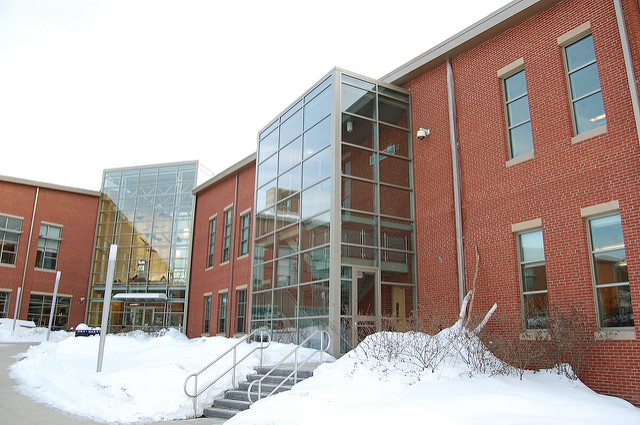Pasqualina Azzarello, an artist, educator and community advocate who is currently serving as City Arts Coordinator for Easthampton City Arts, educated youth on the importance of creating generative spaces.
As part of the Zube lecture series, Azzarello gave her talk in the University of Massachusetts Studio Arts Building on Thursday. The series, which is organized by the Landscape Architecture and Regional Planning department, is named for previous head of LARP, Erv Zube. The department honors his contributions to both the school and the community with a series of lectures aimed to educate with the words and works of leaders from around the world.
Over the course of the lecture, Azzarello recounted her experiences as a freelance public artist, later, as an executive director of the nonprofit organization Recycle-a-Bicycle and as a co-organizer of the Youth Bike Summit. In all these careers, Azzarello emphasized how critical it is to give back to the community by generating spaces for brainstorming and learning.
“I am an artist, and educator, and a community engager,” she said. “In certain circumstances these things may seem very separate, but along the path of my career, I’ve chosen to say yes to the opportunities that present themselves or can be made.”
Originally beginning her creative career in New York City, Azzarello explained what inspired her to actively pursue being a public muralist, saying that she has “always been interested in how cities change.”
“I was interested in construction, because it’s the literal line between the city that is and the city that will be,” Azzarello said.
After working for a period of time as a public muralist, Azzarello was faced with the reality that she would have to find another source of work, as the stock market crash of 2008 was having a profound impact on the real estate market. Most of the work Azzarello focused on was through partnerships with real estate companies, and soon those companies could not afford to hire her anymore, she noted.
“I started looking for work, and I opened my mind to what that would look like. I had so much energy I thought, “What can I give?” Azzarello said.
She emphasized her energy and passion for work and giving back to the community brought her to the nonprofit Recycle-a-Bicycle. She called the organization with the intention of coming in on a volunteer basis, and in a purely serendipitous moment, it happened that there was a board meeting that night to discuss the recent transition and loss of employees.
“I thought, just go and listen,” Azzarello said.
Over the next few years, Azzarello dedicated the majority of her time to Recycle-a-Bicycle, and, recognizing her work ethic and passion for the projects, the organization offered her the position of executive director in July of 2009.
However, Azzarello does not credit most of her work to herself. In fact, she focuses on the importance of the community and the youth in creating such generative spaces. In her time at Recycle-a-Bicycle, she helped put together the first national Youth Bike Summit, a weekend long summit held at the Parsons School of Design at the New School in New York City dedicated to the change and community impact riding a bike can inspire.
Azzarello noted she worked very closely with two other volunteers at Recycle-a-Bicycle to create the Youth Bike Summit—two 16-year-old girls from Brooklyn. While meeting with them and other board members to create the summit, Azzarello discussed the important considerations in creating a generative space.
“I realized in that moment that anyone who rides a bike should be here at the decision-making table,” she said.
The Youth Bike Summit, in its first year had an attendance of about 175 people from 13 different states, according to Azzarello, a very exciting success rate for such a new idea.
The community engagement portion of generative spaces was extremely important to Azzarello, and she addressed it multiple times throughout the lecture. She reiterated the importance of listening to others before oneself, and when asked for advice on how youth may create generative spaces, she answered, “Pay attention to what we can’t see. To step out of the assumption that we know is a great way to begin.”
Mark Hamin, organizer of this Zube lecture and senior lecturer in LARP, agreed. “Generative spaces help overcome ways people can sometimes be territorial,” he said.
Now coming up on a year and a half of living and working in the Pioneer Valley, Azzarello still finds a thrill in working with the change of cities and communities as well as partnering with others.
“It is refreshing for people who are involved in community engagement to get together,” she said.
Azzarello’s lecture inspired some of those who attended the event to give back to the community and to put others before themselves. Cecelela Tomi, a community member from
Leverett, Massachusetts, emphasized the importance of community consideration in creating generative spaces.
“It doesn’t mean anything if the people who live there don’t get to enjoy it,” Tomi said.
Azzarello continues her passion for art and community engagement through her career as city arts coordinator in Easthampton.
“I try to call attention to the movement of change” Azzarello said, “because everyone has a relationship to that change.”
She hopes to continue as an artist and community engager and get to know many more people and their stories through her work.
Annabelle Tocco can be reached at [email protected] and followed on Twitter @AnnabelleTocco.



















